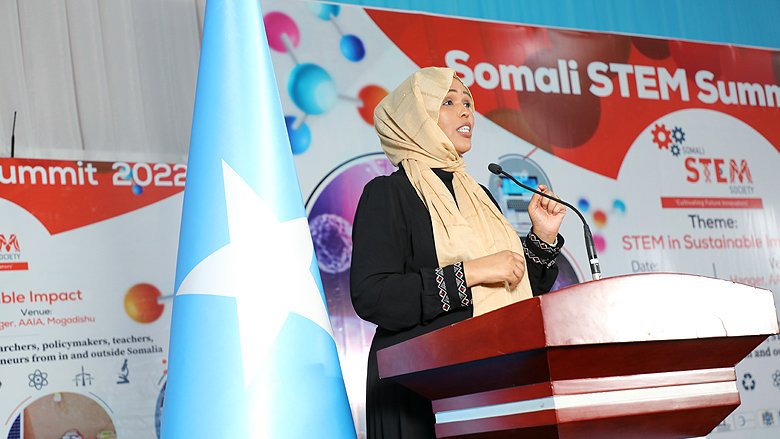As part of ongoing education reforms, Somalia’s Minister of Education recently announced openings for 3,000 teaching positions, part of an initiative to increase access to free public education for school-age children in the country. As the country strives to rebuild its education system after three decades of conflict, some of Somalia’s women such as Dr. Siad are stepping in to catalyze the change. She is driving the uptake of Science, Technology, Engineering and Mathematics (STEM) and technical and vocational education in Somalia.
Globally, there is a gender gap at all levels of STEM disciplines. The 2020 World Bank Report: The Equality Equation: Advancing the Participation of Women and Girls in STEM indicates that although girls outperform boys in school, and women are more likely to go to university than men, women are less likely to study STEM fields and enter into STEM careers.
Dr. Siad travelled to Somalia in 2011 to set up a medical research institution. While volunteering with drought and famine relief efforts, she noticed that “there was lack of technical and vocational training, job creation, employment, and entrepreneurship as well as professional development trainings. That is why I set up the Hano Academy.” After the Hano Academy was established, it received a grant from the World Bank’s Somali Business Catalytic Fund, which supported the start-up of the Hano Social Innovation Hub (HSIH), the first business incubator and innovation hub in Somalia. Today, a total of 1,422 women and girls have benefited from the entrepreneurial courses and STEM projects provided through the HSIH.
Dr. Siad also set up ‘STEM Sisters’, an initiative within the HSIH that trains, coaches, and mentors girls, raises awareness of STEM, and inspires women and girls. It also connects them to other women in the STEM field, locally and in nearby countries, whom they could emulate and know that by working hard and getting educated, they could travel abroad, get a master's degree, even a PhD, and return to work in Somalia. The trainings are also designed to help them get employment. The girls also take part in Hano’s annual STEM conference. Hano Academy has been working with the European Union for the past three years through the Erasmus Plus program, helping girls apply for scholarships.
Dr. Siad reckons that these challenges within the education system arise from the country’s long instability and violence, which has bred a culture of individualism and profiteering rather than investing in future generations. Dr. Siad notes that the government and international partners can leverage the global dialogue on localizing and shifting the power of education by promoting and investing in STEM for women.
“One of the most important things is for all to be on the same page and work together. Supporting and amplifying what is working and creating platforms for local innovators and professionals, who are making a difference, to support one another,” Dr. Siad says, smiling with hope and confidence.

